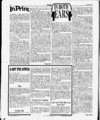| OCR Text |
Show t A iMfpf;inxTfi 10 November, 1979 AUTHOR HARRY CREWS Swampy Lust, Blood fcf Guts '''' by Glenn Abel fcf Johnny McLean he black twirlies still haunt Harry Crews. He fights them daily, pounding away at his lyzUs manual type writer, occasionally throwing the machine across the room in fits of creative rage, but the twirlies persist. They corneal night after the writer has laid himself to rest; they come before his lectures at the University of Florida; they follow in his travels, often driving him into libraries in distant cities just to reaffirm his identity by looking up his name in card catalogs. Crews, like many authors, feels an acute dread of creative impotence. "I live with the constant fear of waking up one morning and not being able to write," said the creator of ten books and countless major magazine articles. "It is always with me the fear, the sinking black twirlies." Like the hero of Kris Kristofferson V song "The Pilgrim," Crews is a walking g contradiction: he's a man whom violence stalks like a cat after fresh meat; at the same time, he is an erudite professor of English. Crews is a cock fighting aficionado with the sensitivity of a poet. He's a southern cracker, raised in the abject poverty of rural Georgia, who has perused every major literary work in the language. His writing has garnered dozens of awards, but he is proudest of the South African government ban on his forty-three-year-o- , tera irF " I - I " -- 0!X? l"J :,s inWs " 1 would never again be able to cross. "A Childhood was by far the most difficult book I've ever written," said Crews, who JOHN KIELY "Crews may occasionally come to class behind a few drinks," countered one of his past students, "but Crews drunk is better than ninety-nin- e percent of the other professors in this university. He cares about his students: he gives them their money's worth in class, and he treats them like human beings. Besides, he's the best writer them." versity gives him a touchstone to return in front of n has produced eight novels and two books. "It was difficult for many reasons as a writer you have to get some distance on a subject to be able to do anything with it. Otherwise you just warp it, distort it, whatever. Secondly, the people I wrote about are still alive. Or their children are still alive. And I have better things to do with my time than to make people non-fictio- in Florida." Crews needs the academic life. The uni- not e, before Crews' birth, with his father catching gonorrhea from a Seminole girl while working in the Everglades. It ends with Crews standing in a tobacco field, back from three years in the Marines, knowing he would never leave his p.eople completely, but realizing he. had put a distance between himself and Bacon County that he supposed to set an example for students all-tim- down with it." The book begins ten years Florida's flagship university in Gainesville; self-destru- ct toll on Crews. "I am one of the sloppy, disgusting drunks," he admits, "the kind mothers can point out to their children as an example of the final evil of alco- non-fictio- the next week he may fade into the Alaskan back country or into the secret society of the Klu Klux Klan on assignment for e now sports a new set of short purple scars. Bouts with alcoholism have also taken their But trauma is the stuff Crews' art is made of. In A Childhood: the biography of a n place, which Time dubbed the best book of 1978, Crews tells of growing up poor in Bacon County, Georgia, a place with "so little margin fpr error, for bad luck, that when something went wrong, it almost always brought something else novel The Gospel Singer. Crews, as the song goes, is partly truth and partly fiction. One week he may be addressing groups of up to 500 students at magazines such as Playboy and Esquire. Despite Crews' rising literary star, his unconventional lifestyle has earned him more than a few detractors in the academic community at UF. Nonetheless, students pack his lectures and there is always a lengthy waiting list for class registration. "I don't understand why a man like Crews is allowed to teach at any top college," said one of his peers at UF. "Professors-ar- the business end of a straight razor; he hol." ld hard-drinkin- - of greens and pork neck in his suburban Gainesville home's kitchen. A golden earring hung from his left lobe. "I had my ribs broken on both sides, my sternum broken, both legs broken and both feet broken." His knees have been crippled from childhood ailments, motorcycle accidents and a recent beating. At a south Florida dog fight Crews found himself on to "a place to finetune his craft. His life on the edge provides raw material for stories the basis for his insights into the human condition. "Being vulnerable," as Crews calls it, has caused him to be cut, broken and boiled alive. As a child, Crews stumbled into a cast-iro- n wash pot filled with water hot enough to scald the hideofTa hog. "I broke my neck when I was seventeen," Crews bulk over a vat said, leaning his 215-pou- nd feel bad about themselves. "The book is obviously a search for my father, whom I never knew, who"died when I was twenty-on- e months old. There is nothing unusual in that, it doesn't make me unique, except that in my case it influ-- enced everything." A Childhood, like most of Crews' works, is |







































